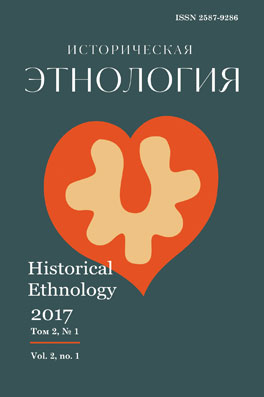
Main menu / 2017, vol.2, no.1 / R.S. Khakimov
Tatar identity: current state and perspectives R.S. Khakimov
6-27 p. The article continues the author's theoretical reflections on identities – their essence, types, conditions of formation and development – which were started in the previous issue. Considering culture as a basis for ethnic, religious, territorial and civic identities, cultural characteristics of each of them are presented. Ethnic communities are a product of historical development based on the consciousness of common origin and belonging to a group with common cultural values and the solidarity that arises due to that. General group values and symbols allow political circles to mobilize ethnic groups for certain behavior. Therefore, the intensity of ethnic identity manifestation is largely determined by political elites, their goals and strategies. With all the stability of ethnicity in its environment, changes occur both under the pressure of external circumstances and for internal reasons. Thereby, the boundaries of ethnicity, like the degree of solidarity, can change over the cause of time. Ethnic, religious, territorial and civil identities are built into a hierarchical structure. Its destruction is dangerous. The rupture of ideological "hoops" which, through norms and regulations, restrain human passions, inevitably leads to instability, rebellion, revolution, all the way to the civil war. Keywords: ethnic identity, civic identity, culture, nation, religious identity, regional identity, Tatars, Tatarstan, Russia
REFERENCES 1. Aberkrombi N., Khill S., Terner B.S. Sotsiologicheskiy slovar’ [Sociological Dictionary]. Translation from English under edition of S.A. Erofeeva. Kazan, Kazan University Publ., 1997. 420 p. (In Russian) 2. Arutyunyan Yu.V., Drobizheva L.M., Susokolov A.A. Etnosotsiologiya [Ethnosociology]. Moscow, Aspekt-Press Publ., 1999. 271 p. (In Russian) 3. Burd’e P. Prakticheskiy smysl [Practical Meaning]. Saint Petersburg, Aleteyya Publ., 2001. 562 p. (In Russian) 4. Gumilev L.N. Ritmy Evrazii [Rhythms of Eurasia]. Moscow, Ekopros Publ., 1993. 576 p. (In Russian) 5. Drobizheva L.M. Sotsial’nye problemy mezhnatsional’nykh otnosheniy v postsovetskoy Rossii [Social Problems of Interethnic Relations in Post-Soviet Russia]. Moscow, Center for Universal Human Values Publ., 2003. 376 p. (In Russian) 6. Lukach Dzh. Konets dvadtsatogo veka i konets epokhi moderna [The End of the Twentieth Century and the End of the Modern Era]. Saint Petersburg, Nauka Publ., 2003. 256 p. (In Russian) 7. Makarova G.I. Identichnosti tatar i russkikh v kontekste etnokul’turnykh politik Rossiyskoy Federatsii i Respubliki Tatarstan [Identity of Tatars and Russians in the Context of Ethnocultural Policies of the Russian Federation and the Republic of Tatarstan]. Kazan, Kazan University Publ., 2010. 248 p. (In Russian) 8. Mankheym K. Izbrannoe: sotsiologiya kul’tury [Selected: Sociology of Culture]. Moscow; Saint Petersburg, Universitetskaya kniga Publ., 2000. 501 p. (In Russian) 9. Moskovichi S. Vek tolp. Istoricheskiy traktat po psikhologii mass [Century of the Crowds. A historical Treatise on the Psychology of the Masses]. Moscow, Center for Psychology and Psychotherapy Publ., 1998. 480 p. (In Russian) 10. Parsons T. Sistema sovremennykh obshchestv [The System of Modern Societies]. Moscow, Aspekt Press Publ., 1998. 270 p. (In Russian) 11. Riker P. Konflikt interpretatsiy. Ocherki o germenevtike [Conflict of Interpretations. Essays on Hermeneutics]. Moscow, KANON-press Publ., 2002. 624 p. (In Russian) 12. Khantington S. Kto my?: Vyzovy amerikanskoy natsional’noy identichnosti [Who are we?: Challenges of the American National Identity]. Moscow, AST Publ., Tranzitkniga Publ., 2004. 635 p. (In Russian) 13. Khobsbaum E. Natsii i natsionalizm posle 1780 g. [Nations and Nationalism after 1780]. Saint Petersburg, Aleteyya Publ., 1998. 108 p. (In Russian) 14. Frankl Dzh. Tsivilizatsiya: utopiya i tragediya [Civilization: Utopia and Tragedy]. Moscow, AST Publ., Astrel’ Publ., 2007. 254 p. (In Russian) 15. Fromm E. Krizis psikhoanaliza [The Crisis of Psychoanalysis]. Moscow, AST Publ., 2009. 252 p. (In Russian) 16. Fukuyama F. Sil’noe gosudarstvo: upravlenie i mirovoy poryadok v ХХI veke [Powerful State: Governance and World Order in the 21st Century]. Moscow, Vladimir, VKT Publ., 2010. 222 p. (In Russian) 17. Etnicheskaya identichnost’ tatar v regional’nykh kontekstakh [The Ethnic Identity of Tatars in Regional Contexts]. Ed. by G. Gabdrakhmanova, G. Makarova. Kazan, Sh. Marjani Institute of History Publ., 2015. 256 p. (In Russian) 18. Etnicheskie gruppy i sotsial’nye granitsy. Sotsial’naya organizatsiya kul’turnykh razlichiy [Ethnic Groups and Social Boundaries. The Social Organization of Cultural Differences]. Ed. by F. Bart. Moscow, Novoe izdatel’stvo Publ., 2006. 200 p. (In Russian) 19. Yunger F.G. Yazyk i myshlenie [Language and Thinking]. Saint Petersburg, Nauka Publ., 2005. 301 p. (In Russian) About the author: Rafael S. Khakimov is a Doctor of Science (History), Director of Sh. Marjani Institute of History of the Tatarstan Academy of Sciences (TAS), VicePresident of the TAS and Academician at the TAS (7, Baturin Str., Kazan 420111, Russian Federation); history@tataroved.ru
Received 21.02.2017 Accepted for publication 08.06.2017 Published Online 17.11.2017 |
Istoricheskaya etnologiya Historical Ethnology
Scientific journal







